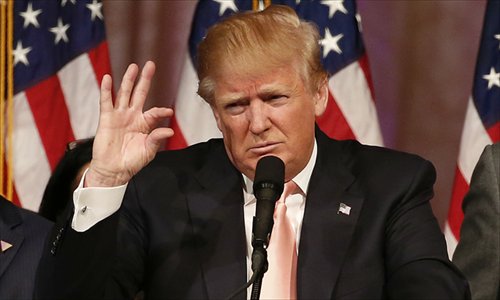Trump’s protectionist rhetoric worries Chinese
American anger against China originates from their own social woes

Republican presidential candidate Donald Trump addresses a press conference following his victory in the Florida state primary on Tuesday in West Palm Beach, Florida. Photo: AFP
Increasing popular support for Republican front-runner Donald Trump may indicate a rising trend of protectionism and isolationism in the US which could cast a shadow on Sino-US relations, observers said Wednesday, particularly after the controversial candidate scored big wins in Tuesday's primaries.
The outspoken real estate tycoon won primaries in Florida, Illinois and North Carolina on the third Super Tuesday of the presidential nominee race, knocking rival Marco Rubio out.
This leaves only Ted Cruz and John Kasich in the running, with Trump looking increasingly likely to secure the GOP nomination.
On the Democratic side, Hillary Clinton saw big wins, dealing a blow to rival Bernie Sanders, which more than likely will mean Clinton will face off against Trump.
Chinese observers believe that growing public support in the US for Trump indicates simmering populism, protectionism and isolationism.
"Trump's wins show many US residents' discontent over the country's current economic and diplomatic strategies toward emerging economic entities, including China," Zhang Zhizhou, a research fellow with the School of International Relations and Diplomacy of Beijing Foreign Studies University told the Global Times.
The New York Times reported Tuesday that increasing levels of Chinese imports from 1999 to 2011 cost up to 2.4 million American jobs, while the US government should reconsider how policymakers deal with "trade's distributional consequences."
"To be fair, those voters' anger and frustration are mainly caused by the negative side of globalization, as well as technological changes, but they prefer Trump's theory of blaming countries like China," Zhang said.
During his presidential campaign, Trump has claimed that his business experience means he will be able to help the US get the better of China.
"When Donald J. Trump is president, China will be on notice that America is back in the global leadership business and that their days of currency manipulation and cheating are over," an article on Trump's campaign website reads.
Trump also proposed a 45 percent tariff on Chinese imports in January.
Trump's tough stance on China has propelled protectionism and populism in the US, and this may negatively affect US policies toward China, Ruan Zongze, vice president of the China Institute of International Studies told the Global Times on Wednesday.
"This trend is surely not a good sign for the two countries' future relations and cooperation," Ruan said.
Widening income gap
"Trump's voters, especially blue-collar workers, are craving for a radical change in the country, as things have been changing away from them, and the places where they live may feel stagnant in many ways," Zhang said.
According to the US Bureau of Labor Statistics, typical American workers and the nation's lowest-wage workers have seen little or no growth in their real weekly wages from 1979 to 2014. The richest 10 percent saw their real weekly wages rise from an average of $1,422 in 1979 to $1,898 in 2014.
"The social contradictions in US society have worsened since the economic crisis of 2008. The country's bailout policies didn't benefit ordinary people, they benefitted the rich," said Zha Xiaogang, research fellow at the Shanghai Institute for International Studies.
"The increasing gap between the rich and the poor is one of the fundamental reasons that protectionism is growing quickly in the US, and it is going to develop even further," Zha said.
Rising US protectionism would strongly affect economic and trade cooperation between China and the US, regardless of who the next president is, experts said.
"The US is very likely to take stricter measures on economic and trade cooperation with China, such as promoting the Trans-Pacific Partnership to pressure China's economic influence, as well as taking a tougher stance on China on international economic rule-making," Zha said.
Jin Canrong, an associate Dean at the School of International Studies at the Renmin University of China, told the Global Times that this US protectionism and isolationism could also favor China.
Protectionism can diminish the openness of the US market, offering more opportunities to China, which has been making efforts to give foreign investors wider access to the Chinese market, Jin said.
Meanwhile, the rising isolationism will make the US less active in international affairs, offering China more space to project its international influence, Jin added.
Chinese Premier Li Keqiang said at a press conference on Wednesday that Sino-US relations will move forward no matter who wins the US presidential election in November.
"As long as we sincerely manage our disputes, I believe the common interests between us will expand," Li said.